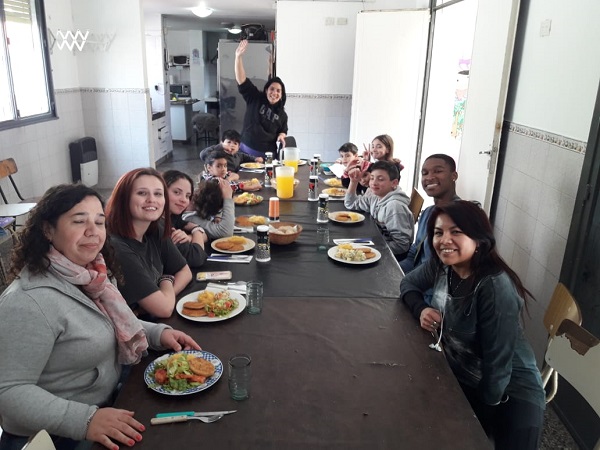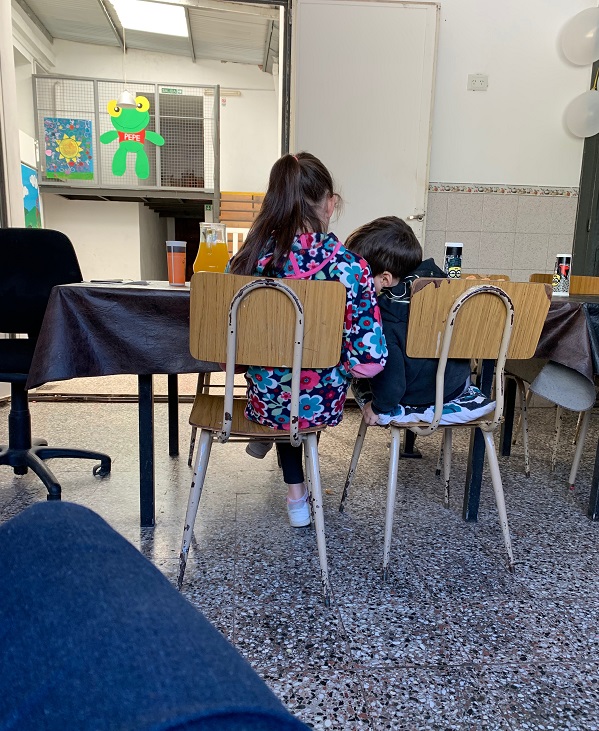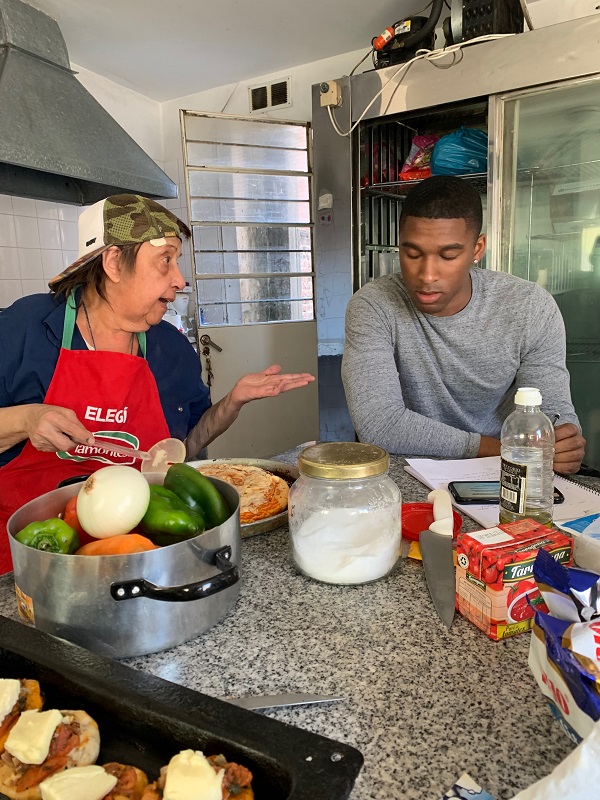Every Thursday, I wake up at 9 in the morning to start my day. Now, to a normal person, 9 a.m. is late, but for me (a student in Argentina and a regular 20-year-old), that is EXTREMELY EARLY. In Argentina, some people even say 11 a.m. is early. However, I get up, get dressed, grab an apple for breakfast, and I’m out the door. After popping my headphones in, I walk for about 20 minutes, pass the University of Belgrano and continue on to my favorite place in all of Argentina: a home for at-risk youth called Fundación Juanito.
While studying abroad in Buenos Aires, I’ve had the opportunity to do community service once a week every week for three hours. I cook and clean, I play with kids, and I help things run smoothly at the foundation. And doing community service abroad is now something that I recommend everyone do. It’s rewarding, an opportunity to learn about the culture, a space to practice your language skills, and a chance for you to give back to the community that is giving you so much while you study abroad. Most students don’t think about volunteering when studying abroad. Their usual plans are to study, travel, learn about the culture, and make friends. But, to be honest, community service is an opportunity for you to do all of that and more. Here are my top reasons you should do community service while abroad, what to expect, and how to get started!
Why should I do community service abroad?
You’re already a student and you have a busy schedule. I’m sure doing community service wasn’t exactly at the top of your list when thinking of the best things to do in another country. But, it could be the experience you get the most out of.
First and foremost, it’s a great way to get involved with the citizens and learn about the culture. You’ll be able to see the problems of the country up close and personal, and there is no other experience that will really give you that, no matter where you go. You can talk to the locals about the things that are impacting them or the government. Ask for clarification on certain issues and really get a firsthand account of what’s going on in the country.
 If you have ever wanted to test your language skills, community service is a great option. At Fundación Juanito, pretty much no one spoke English and at first, this was absolutely terrifying. Now, when I first arrived in Buenos Aires, I realized I had been seriously underestimating myself and my ability to speak Spanish. But having to speak Spanish to get work done or to ask questions really worried me. After a few weeks, and more than a few miscommunications, I found myself becoming more confident when speaking Spanish. My vocabulary was expanding and I was finding different ways to say things when I couldn’t find the word I needed. I know for a fact that doing community service has really improved my Spanish abilities and made me a more comfortable bilingual.
If you have ever wanted to test your language skills, community service is a great option. At Fundación Juanito, pretty much no one spoke English and at first, this was absolutely terrifying. Now, when I first arrived in Buenos Aires, I realized I had been seriously underestimating myself and my ability to speak Spanish. But having to speak Spanish to get work done or to ask questions really worried me. After a few weeks, and more than a few miscommunications, I found myself becoming more confident when speaking Spanish. My vocabulary was expanding and I was finding different ways to say things when I couldn’t find the word I needed. I know for a fact that doing community service has really improved my Spanish abilities and made me a more comfortable bilingual.
Volunteering is something that the community benefits from, but it’s something you benefit from as well. During my time volunteering, I found out that there isn’t a big emphasis put on volunteering in Argentina and Latin America as a whole. This was super surprising to me because doing community service is something people almost always expect to see on your resume. So many countries have a shortage of volunteers, and any help you can give is useful. Community service is an opportunity for you to feel good about yourself as well. Whenever I’m leaving community service, I call my boyfriend at home and gush about how much fun it was and how I can’t wait to go back. It’s an opportunity for you to make a difference for someone else, and not everyone has that opportunity. So, it’s important that you take that opportunity when you can.
What should I be expecting?
So, now you know all of the great reasons to volunteer. But what should you be prepared for? What kinds of challenges will there be? What is the workload like? Well, don’t worry, because most of the time what you’re doing doesn’t even feel like work and things are generally a breeze! However, there can be the occasional rough day, so here’s what you should be expecting if you decide to do community service abroad.
1. The language barrier
While this is a perfect space for you to practice your language skills, you’ll also suddenly become very aware of just how proficient you are (or aren’t) in the language. This can be a little unnerving at first, but don’t worry. All of the workers there will do their best to communicate with you as clearly as possible. To help with this, I recommend brushing up on vocabulary that would likely be used at your service location, and talk! Talk with the workers as much as possible, because this is the best practice you could ever have when it comes to learning a language.
2. Be prepared to help with anything
There's a wide variety of service opportunities open to you no matter where you go. And the work you’re expecting to do may turn out to be a few different jobs. Don’t shy away from it and enjoy it! One thing’s for sure when it comes to community service: it’s never boring.
3. Learn a little bit about your organization
Learning about the issues your organization is trying to combat is also a good thing to do. There’s a lot of fun to be had while doing service, but you are doing this community service for a reason. Usually you’re helping to lessen the burden of a serious issue on society, such as hunger, homelessness, or abuse. So, take some time to learn about the different programs the organization offers, and how those issues have been impacting the country.
4. Schedule in 3-4 hours a week for service-related work
Realistically, you’ll only be spending time doing service work once a week for three hours. But there are some service opportunities such as the Instituto de Vivienda de la Ciudad (IVC) that require work outside of the designated working hours. Plus, you may just enjoy your service so much you choose to spend more time there. When you start to schedule your classes, make sure you take into account the fact that you’ll need extra time for getting to your community service, actually doing your community service, and time for extra work you may need or decide to do.
 How do I get involved?
How do I get involved?
If you’re studying in Argentina with CEA at the University of Belgrano, the university has a class specifically for this community service. You meet twice a week -- once in class for an hour and a half, and once at your service for three hours. In class, you read articles relating to service in Argentina as well as prevalent social issues such as women’s rights, education, poverty, and more. The class gives you a very good look at what issues are impacting Argentina in the present.
Throughout the class, you have three or four different options for where you would like to work. These options may rotate yearly, but generally this is the type of work you’ll be doing.
Pecohue
Pecohue is a community farm that is run by a hospital in the city of Buenos Aires. It is a space for adolescents at the hospital. Gardening is used as an outlet for these kids and as a productive project. At Pecohue, the kids learn things such as responsibility and independence. Generally the kids helping with Pecohue who are not volunteers are kids who may be at risk, or that have trouble integrating into society. Volunteer work consists of gardening, organizing donations, and selling the produce.
Fundación Juanito
Juanito is a non-governmental organization that works with young boys and girls who have been removed from the home due to it being an unstable or violent environment. The kids live at the foundation and have a team of childcare specialists who give them 24/7 care. The kids attend school, see the doctors, play games, and do everything else a normal kid does. The work at Juanito includes helping cook meals, playing with the kids, and helping organize and run fundraising events.
Instituto de Vivienda de la Ciudad (IVC)
IVC is a resource of the city that helps families find affordable housing and better integrate into society. The IVC and its volunteers work with lower-income families on different projects to assist them with having a happy and healthy life. Volunteers at the IVC help students with their English homework from school, organize activities to help the kids learn English, and they maintain a line of contact with the kids' parents to make sure they are up to date on their progress.
Museo Evita
The Evita Museum is biographical museum dedicated to the life and work of Eva Peron, arguably the most prominent woman in Argentina’s political history, teaching others about peronismo, and researching and informing people about women in politics. Volunteers at the Evita Museum will help cultivate and care for exhibits, and they also have the opportunity to become a guide for the museum.
Each of these options is around a 30-minute walk from the University of Belgrano and have different hours for each of the volunteers.
What if I’m not attending a university with a community service class?
If you’re not attending a university that has a program like this, don’t worry! Reach out to your point of contact in the country and ask them for information on volunteering. The process to become a volunteer is not a lengthy one and usually only requires that you take a small orientation to get started. Don’t be afraid to do some research on your own to find a volunteer opportunity as well.
Now you know why volunteering abroad is such a great opportunity, what to expect from the experience, options available to you in Buenos Aires, and how to get involved if you don’t have those opportunities. Volunteering is one of the most rewarding study abroad program experiences I’ve had during my time in Buenos Aires. I wouldn’t trade it for anything.
If you’re looking for a unique experience or an opportunity to give back, I would highly recommend looking into doing community service while abroad. And, who knows, it may lead you to a passion you never expected you’d have!








